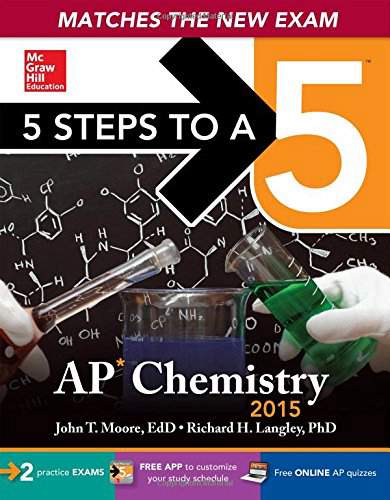Connecting...

For more information, please see full course syllabus of AP Chemistry
AP Chemistry Naming Compounds
This lecture reviews the parts of the periodic table (nonmetals and metals, as well as alkali metals, alkaline earth metals, transition metals, halogens, and noble gases). Some elements naturally occur as diatomic molecules, like nitrogen and oxygen. The periodic table also lists the atomic number (average of isotopes), and the chemical symbols. Ionic compounds are neutral molecules formed from charged ions (one metal, one non-metal). Positive ions (cations) are listed first in the compound and negative ions (anions) second with an “-ide” suffix (oxide, chloride, etc.). Polyatomic ions contain more than one atom and can have a variety of prefixes and suffixes. Covalent compounds (nonmetals only) follow similar principles, but the number of atoms is described using prefixes like mono-, di-, tri-, etc. Acids follow special naming conventions and always list hydrogen first. The lecture concludes with a review of how to determine the percent composition of an element in a compound by mass.
Share this knowledge with your friends!
Copy & Paste this embed code into your website’s HTML
Please ensure that your website editor is in text mode when you paste the code.(In Wordpress, the mode button is on the top right corner.)
- - Allow users to view the embedded video in full-size.










































 Answer Engine
Answer Engine




1 answer
Wed Aug 24, 2022 6:25 PM
Post by Mithil Krishnan on August 24, 2022
I wanted to know if you could provide me some worksheets.
1 answer
Wed Jul 1, 2020 12:54 PM
Post by Claire Zhang on July 1, 2020
Hello professor, I wonder if there's a way to identify wether a random polyatomic ion name ends in "ate" or "ite"
Thank you!
3 answers
Wed Aug 15, 2018 6:42 AM
Post by Nick Jiang on August 14, 2018
Hi Professor,
I have a few questions:
1. Is every compound that has hydrogen an acid? If so, why?
2. Kind of relating to my last question, I don't understand why we can't name H2SO4 as hydrogen sulfate. But there's also HSO4- for hydrogen sulfate.
Thanks,
Nick
1 answer
Tue Jun 19, 2018 5:55 AM
Post by Neeraj Lalwani on June 17, 2018
Hello Mr. Hovasapian,
Just a quick question: Why did you choose to write acetate as (AcO)- rather than (C2H3O2)-?
1 answer
Mon Jan 8, 2018 4:22 AM
Post by Amy Zhang on January 6, 2018
In the Sixth Editio Zumdahl Chemistry textbook you recommended to me, it says that the periodic table groups can be written as either 1-18, or with letters like 3A, 4A, etc. However, besides in the textbook, I've only ever seen the 1-18 and not the letter names. Is that like a new thing now, as the textbook was printed in 2003?
1 answer
Wed Jan 3, 2018 3:54 AM
Post by Qiaoxiang Dong on December 26, 2017
Hi Prof Hovasapian!
How would you name a covalent compound with a subscript that is greater than 10? Would you use other prefixes?
Thanks
Calvin Huang
1 answer
Thu Aug 31, 2017 5:40 AM
Post by Yosef Charkatli on August 30, 2017
Greetings professor Hovasapian!
I just wanted to thank you for your great lessons and let you know that I was able to score a 4 on the AP chemistry test by relying solely on your lessons, and I am sure that if I payed a little more attention to your lessons I would have scored a 5. You made this course a lot easier for me and you truely are the best chemistry teacher I have learned from. I simply can't thank you enough.
Best regards.
1 answer
Fri Aug 18, 2017 3:12 AM
Post by Carlins Almonor on August 16, 2017
My teacher includes the naming of hydrates in our assessments. How would one go about naming hydrates?
3 answers
Fri Jul 21, 2017 8:15 PM
Post by Amy Zhang on July 20, 2017
Hi Professor! I was wondering if you could give me the names and links for instructional textbooks and practice workbooks that follow your AP Chemistry course. Thanks!
2 answers
Last reply by: Kenneth Dietz
Mon Jul 17, 2017 1:22 PM
Post by Kenneth Dietz on July 10, 2017
so whats the story with compounds like monosodium glutamate? Is it just not following the rules. Not following these rules seems common on labels of ingredients. ( trisodium phosphate?) Is it just a different system?
1 answer
Tue Oct 25, 2016 10:56 PM
Post by Anu Yelisetti on October 25, 2016
Hi Prof. Hovasapian!
I just wanted to let you know that so far your lectures have helped me so much in school and I really enjoy them!
I don't have any specific questions pertaining to this video, but I had one about the overall course. I take Honors Chemistry in school right now, which does cover some of the basic concepts covered in AP chemistry, and I wanted to take the AP test for Chemistry this year, so would completing the course on this website be enough preparation, or would I have to take another "self-study" class outside of school? Currently, I've been using this site and reading the Chemistry textbook by Zumdahl. I'd really appreciate your feedback!
Thanks,
Anu Yelisetti
2 answers
Mon Jun 27, 2016 7:07 PM
Post by Mohamed E Sowaileh on June 19, 2016
Hello Dr. Hovasapian,
Is 2 months period enough to finish the whole course, or you don't recommend that? and is it sufficient to study from your lectures only without textbooks to gain full understanding?
1 answer
Wed May 11, 2016 2:33 AM
Post by Mohamed E Sowaileh on May 9, 2016
is this course suitable for a collage level? I mean the details.
1 answer
Sat Oct 24, 2015 7:02 PM
Post by Karthik Gnanakumar on October 24, 2015
Hello Prof. Hovasapian!
This a question not pertaining lesson specifically, but the whole AP Chemistry course you are teaching as a whole. All I wanted to ask is that if the AP Chemistry Lectures you teach are up-to-date. CollegeBoard is changing things up and the AP courses have new set of foundations being built upon. So do these lectures you teach pertain to the newer version of the AP Test or the old AP Test?
Thank You,
Karthik Gnanakumar
P.S: I love your lectures! Keep up the good work. The way you teach really helps me understand the subject.
1 answer
Mon Oct 19, 2015 12:04 AM
Post by Xinyuan Xing on October 17, 2015
Hi Professor Hovasapian,
I'm Alina from China. Just want to go back here to say Thank You. I've got a 5 on my AP chemistry, and your lectures are basically all my preparation materials. Thank you so much for your dedicated lectures! They are great lectures for students (including me) who desperately want to learn under a situation that no one around them is familiar with the subject.
Wish you all the best,
Alina
1 answer
Last reply by: Jim Tang
Sat Jul 18, 2015 9:59 PM
Post by Jim Tang on July 18, 2015
Wait, isn't acetate C2H3O2-? Where did you get AcO?
2 answers
Fri Jul 10, 2015 4:12 PM
Post by Jinbin Chen on July 7, 2015
Hi, Mr. Raffi.
I am writing this comment to thank you for this AP Chemistry lecture series. I was going to merely learn some basic chemical principles when I started this series last summer, but I ended up changing my mind about my future majors because of these lectures. I checked my AP scores for chemistry today, and I got a 5 on it. Now I am planning to get a degree in chemistry (or some related field such as engineering), and I thank you for your effort to teach chemistry as clearly as possible so that people can appreciate this subject.
I do have a few questions though. Is the analytical chemistry lab a good substitute for general chemistry lab? I self-studied the entire AP curriculum, so I do want some exposure to the lab techniques without having to do general chem lecture again (since they tied the lecture and lab together). Also, are topics such as transitional metals and nuclear chemistry important later on for chem majors (these topics are left out completely in AP)?
Thanks
Jinbin
1 answer
Sat Jun 20, 2015 4:51 PM
Post by Katie Early on June 19, 2015
Professor Hovasapian- I just wanted to let you know that I took Biochemistry last year and it was your lessons that got me through it. I currently teach high school Chemistry, but I do not enjoy biochem and organic as much as straight inorganic. I am preparing to teach AP Chemistry and these lessons help better than anything I can find for those little "reminders." You are so awesome!
Thank You,
Katie Early
1 answer
Thu Mar 12, 2015 3:30 AM
Post by Richard Meador on March 5, 2015
The periodic table shows that the number of protons per element increases from 1 (Hydrogen) to 111 (Rg). Why are there no gaps? In other words, what in the formation process caused there to be no gaps in the rising number of protons per atom?
1 answer
Mon Mar 2, 2015 11:16 PM
Post by aimun amatul-hayee on March 2, 2015
do the transition metals have a charge
1 answer
Mon Mar 2, 2015 11:12 PM
Post by aimun amatul-hayee on March 2, 2015
how does calcium phosphides charge equal 0 if the formula is Ca3P2
2 answers
Last reply by: Andrew Lewis
Wed Mar 11, 2015 10:01 PM
Post by Hayley Gao on December 23, 2014
I can't watch any videos on this web. it's just show network error, but i can use any other webs and i still have the membership. Could you help me about that? Thanks!
1 answer
Thu Nov 6, 2014 1:34 AM
Post by Shih-Kuan Chen on November 5, 2014
Dear Dr. Hovasapian,
Do you think you could provide a list of signs and names of polyatomic anions that will possibly appear on the AP exam?
1 answer
Fri Aug 22, 2014 8:43 PM
Post by Okwudili Ezeh on August 22, 2014
Please could you tell me the difference between your own course and the other 2 general chemistry courses that are being offered on this website?
Are you covering more material?
1 answer
Tue Jul 1, 2014 6:56 PM
Post by Jerry Liu on June 30, 2014
Is this course still relevant to the new and updated AP test?
Thanks!
Jerry
2 answers
Last reply by: Datevig Daghlian
Fri Jun 27, 2014 11:33 AM
Post by Datevig Daghlian on June 12, 2014
Dear Dr. Hovasapian,
Thank you for responding to my previous question--your guidance and passion for chemistry is greatly seen in your lectures and your effort in teaching chemistry. I would ask you one more thing--I am currently home schooled and am in my Junior year. I have been looking around for an online, interactive AP Chemistry course and wanted to ask you if you had any particular recommendations? Please if you can let me know, I will be very thankful! Thanks again for your giving of your valuable time to assist me!
Thank You,
George Daghlian
2 answers
Last reply by: Datevig Daghlian
Wed Jun 11, 2014 9:47 AM
Post by Datevig Daghlian on June 10, 2014
Dear Dr. Hovasapian,
I would like to thank you for your passion in teaching and explaining the concepts of Chemistry. This coming year I will be taking AP Chemistry. Not having any chemistry background, how do you recommend I should prepare over the summer? Any insight you can give is greatly appreciated! God Bless!
Thank You,
George Daghlian
1 answer
Sun Jun 8, 2014 3:43 AM
Post by Jinbin Chen on June 6, 2014
Hi, professorï¼
I am very interested in starting this chemistry course, but the last time I took a chemistry class was two years ago (and it was very basic). Should I watch some other chemistry videos in this site before starting AP Chemistry?
By the way, the new AP Chem test is being administered starting from this year. Are you planning to post some new videos regarding the change in this exam?
Thanks and take care!
Jinbin
1 answer
Last reply by: Nada A.
Tue Nov 5, 2013 5:51 AM
Post by Nada A. on November 5, 2013
PCl5 ---> PhosphourPetaCloride ? it is ending with ide... doesnt that mean its an Ion? and its not... shouldn't it be PhosphoursPetaChlorine?
3 answers
Fri Nov 1, 2013 12:30 AM
Post by robina saeed on October 31, 2013
Hi Professor,
Is this a good course to prepare for the MCAT chemistry section or would I need to stick with a textbook? thanks and take care
0 answers
Post by yannick Haberkorn on October 9, 2013
at 17:08 i thought nitrogen carried a -3 charge and not a - 1 charge .. could someone please clarify
1 answer
Wed Oct 9, 2013 4:52 PM
Post by yannick Haberkorn on October 9, 2013
at 17:08 i thought nitrogen caries a -3 charge and not a -1 charge ? its not really clear
1 answer
Last reply by: robina saeed
Fri Aug 2, 2013 2:10 PM
Post by robina saeed on August 2, 2013
Hi Professor
Thanks for the earlier response. I have one more question. I have had a full year of general chemistry. Do I need organic chemistry to begin this course?
Thanks,
Robina
1 answer
Thu Feb 28, 2013 4:39 PM
Post by Youssef Sadki on February 28, 2013
I wpould like to thank you so much ...you make really like how easy to drink water...
0 answers
Post by Professor Hovasapian on February 18, 2013
Hi Raj,
I hope you're doing well. Thank you for your kind words, and I'm happy to hear you are enjoying AP Chem.
Regarding the OH, I'm wondering if you meant the OH- polyatomic Ion. If so, then, because it is an Ion that has a charge of -1, it is named as a single entity, and does not fall under the systematic procedures for naming compounds -- we simply rfer to it s Hydroxide.
Hydrogen Peroxide is actually H2O2. Now, O2- (an Oxygen atom with a 2- charge) binds to to H+ ions to create this molecule.
If the molecule were HO, without a charge, then you would be correct: it would be called Hydrogen Monoxide. In fact, water, which is the common name, and which you know as H2O -- it's systematic name is exactly Dihydrogen Monoxide.
If I have misinterpreted you question, Raj, please let me know, and I will remedy the issue.
Best wishes for a happy and productive year.
Raffi
0 answers
Post by rajendra irani on February 18, 2013
HO -Hydrogen peroxide. why not it is named as hydrogen monoxide?
0 answers
Post by rajendra irani on February 18, 2013
Dear Sir,
Great Teaching and I am really enjoying AP Chemistry.
Kind Regards
Raj
1 answer
Tue Jan 29, 2013 3:37 PM
Post by Antoni Szeglowski on January 27, 2013
Best teacher on Educator!
0 answers
Post by Riley Argue on June 14, 2012
I sat in first year chem in high school for a complete year, but my teacher could not explain this material to save her life.
But somehow you explained it so simply. Thank you!
0 answers
Post by Yaron Zaret on June 10, 2012
awesome teacher
0 answers
Post by Abdihakim Mohamed on May 7, 2012
Where where you professor for the past two years of my life, I wish I came across this website way earlier.
0 answers
Post by mateusz marciniak on May 5, 2012
great video but i was wondering, isn't Acetate C2H3O2 -1?
0 answers
Post by Miguel Suarez on April 6, 2012
Nice video really good work professor, wish all professor would explain like you